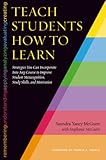Teach students how to learn : strategies you can incorporate into any course to improve student metacognition, study skills, and motivation / Saundra Yancy McGuire with Stephanie McGuire ; foreword by Thomas A. Angelo. [print]
Material type: TextPublication details: Sterling, Virginia : Stylus Publishing, LLC, (c)2015.Edition: First editionDescription: 288 pages. 15.24 cmContent type:
TextPublication details: Sterling, Virginia : Stylus Publishing, LLC, (c)2015.Edition: First editionDescription: 288 pages. 15.24 cmContent type: - text
- computer
- online resource
- 9781620363164
- 9781620363188
- LB1025.M478.T433 2015
- LB1025
- COPYRIGHT NOT covered - Click this link to request copyright permission:
| Item type | Current library | Collection | Call number | Status | Date due | Barcode | |
|---|---|---|---|---|---|---|---|
 Circulating Book (checkout times vary with patron status)
Circulating Book (checkout times vary with patron status)
|
G. Allen Fleece Library CIRCULATING COLLECTION | Non-fiction | LB1025.3.M356 2015 (Browse shelf(Opens below)) | Available | 31923001719232 |
COPYRIGHT NOT covered - Click this link to request copyright permission:
Saundra's journey: from traditional instructor to academic transformer -- Why don't our students already know how to learn? -- Metacognition: what it is and how it helps students become independent learners -- The power of teaching Bloom's Taxonomy and the study cycle to students -- Metacognitive learning strategies at work -- Mindset matters -- Connections between motivation, emotions, and learning -- What faculty can do to boost motivation, positive emotions, and learning -- What students can do to boost motivation, postive emotions, and learning -- Partnering with your campus learning center -- Teaching learning strategies to groups -- Teaching uprepared students.
Miriam, a freshman Calculus student at Louisiana State University, made 37.5% on her first exam but 83% and 93% on the next two. Matt, a first year General Chemistry student at the University of Utah, scored 65% and 55% on his first two exams and 95% on his third-These are representative of thousands of students who decisively improved their grades by acting on the advice described in this book. What is preventing your students from performing according to expectations? Saundra McGuire offers a simple but profound answer: If you teach students how to learn and give them simple, straightforward strategies to use, they can significantly increase their learning and performance. For over a decade Saundra McGuire has been acclaimed for her presentations and workshops on metacognition and student learning because the tools and strategies she shares have enabled faculty to facilitate dramatic improvements in student learning and success. This book encapsulates the model and ideas she has developed in the past fifteen years, ideas that are being adopted by an increasing number of faculty with considerable effect. The methods she proposes do not require restructuring courses or an inordinate amount of time to teach. They can often be accomplished in a single session, transforming students from memorizers and regurgitators to students who begin to think critically and take responsibility for their own learning. Saundra McGuire takes the reader sequentially through the ideas and strategies that students need to understand and implement. First, she demonstrates how introducing students to metacognition and Bloom's Taxonomy reveals to them the importance of understanding how they learn and provides the lens through which they can view learning activities and measure their intellectual growth. Next, she presents a specific study system that can quickly empower students to maximize their learning. Then, she addresses the importance of dealing with emotion, attitudes, and motivation by suggesting ways to change students' mindsets about ability and by providing a range of strategies to boost motivation and learning; finally, she offers guidance to faculty on partnering with campus learning centers. She pays particular attention to academically unprepared students, noting that the strategies she offers for this particular population are equally beneficial for all students. While stressing that there are many ways to teach effectively, and that readers can be flexible in picking and choosing among the strategies she presents, Saundra McGuire offers the reader a step-by-step process for delivering the key messages of the book to students in as little as 50 minutes. Free online supplements provide three slide sets and a sample video lecture. - Amazon.
This book is written primarily for faculty but will be equally useful for TAs, tutors, and learning center professionals. For readers with no background in education or cognitive psychology, the book avoids jargon and esoteric theory.
There are no comments on this title.
